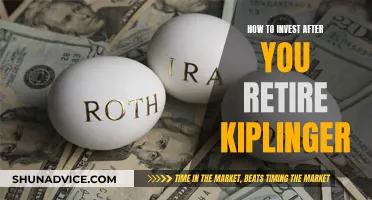
Whether it is better to pay off your home loan or invest depends on your financial situation, risk tolerance, and long-term goals. Paying off your mortgage early can save you thousands of dollars in interest and give you peace of mind. On the other hand, investing your money can provide higher returns, increase your future wealth, and offer better liquidity.
| Characteristics | Values |
|---|---|
| Interest savings | Paying off your mortgage early can save you thousands in interest payments. |
| Peace of mind | Being debt-free can ease your burden. |
| Build equity | Paying down your mortgage faster means building equity in your home more quickly. |
| Opportunity cost | Any extra money you spend on paying down your mortgage faster is money you aren’t able to use for other financial goals. |
| Wealth is tied up | Property is an illiquid asset, meaning you can’t convert it to cash quickly or easily. |
| Loss of tax breaks | You may lose out on tax deductions for mortgage interest if you normally itemize. |
| Higher returns | The stock market has, for many years, provided higher average returns than mortgage rates. |
| Liquid investment | Stocks, bonds and other market investments mean you can easily sell and access your money if you need to. |
| Employer match | If your employer offers a match on your retirement account, you get additional free money. |
| Higher risk | There is more volatility in the stock market than in the housing market. |
| Increased debt | Choosing to invest your money may not be the best option if you don’t like the idea of having debt. |
What You'll Learn

Paying off your mortgage early can save you thousands in interest
Paying off your mortgage early can be a great way to save money on interest. However, it's important to consider the potential downsides and make sure that it's the best decision for your financial situation. Here are some key points to keep in mind:
Potential savings
Let's look at an example to understand the potential savings. Suppose you borrow $150,000 to buy a home at a 6% interest rate with a 30-year term. By the time you pay off your loan, you'll have paid a total of $173,757.28 in interest. Now, if you pay an extra $100 every month towards the same loan, you'll only pay $128,170.57 in interest, saving you a significant $45,586.71.
Peace of mind
One of the biggest advantages of paying off your mortgage early is the peace of mind that comes with owning your home outright. It can be a huge stress reliever, especially as you approach retirement, to know that you no longer have to worry about making monthly mortgage payments. This can be a strong argument for early repayment, even if the financial gains might be higher with other investments.
Opportunity cost
On the other hand, paying off your mortgage early means that money is now tied up in your home, which is an illiquid asset. It might be challenging to access that money if you need it for other purposes, such as investments or emergencies. This opportunity cost could be a significant downside, especially if you have other financial goals you want to pursue.
Other investments
Historically, the stock market has provided higher returns than the interest rates on mortgages. For example, the S&P 500 has returned an average of 10% annually since its inception in 1926. By investing your extra money instead of paying off your mortgage early, you could potentially earn more in the long run. However, investing in the stock market does come with higher risk and volatility.
Emergency funds and other debts
Before committing to paying off your mortgage early, it's crucial to ensure that you have sufficient emergency funds and that you're not neglecting other high-interest debts. Credit card debt and student loans, for instance, often carry much higher interest rates than mortgages, so you might save more by prioritising those first.
Prepayment penalties
Lastly, be aware of any prepayment penalties that your mortgage may carry. Some lenders charge a fee if you pay off your mortgage early, and this could eat into your potential savings. Check your mortgage contract or consult your lender to understand if and when such penalties apply.
In conclusion, paying off your mortgage early can indeed save you thousands in interest, but it's important to weigh this against other factors such as opportunity cost, investment alternatives, emergency funds, and prepayment penalties. The right decision will depend on your individual financial circumstances and risk tolerance.
Pay Off the House or Invest: Where Should Your Money Go?
You may want to see also

You could lose out on tax deductions for mortgage interest
When deciding whether to pay off your mortgage or invest, it's important to consider the potential loss of tax deductions for mortgage interest. While paying off your mortgage early can provide significant interest savings, it's important to understand the tax implications of this decision.
In the United States, mortgage interest paid on a loan of up to $750,000 is tax-deductible. This means that a portion of the interest you pay to your lender can be deducted from your taxable income, resulting in potential tax savings. However, to claim this deduction, you must itemize your deductions on Schedule A of Form 1040. Itemizing may not always be advantageous, as taxpayers must forego the standard deduction, which may result in a higher reduction in taxable income. It's essential to consult a tax professional to determine the best course of action for your specific situation.
Additionally, the tax benefits of mortgage interest deductions tend to be more significant in the early years of a loan. During these initial years, a larger proportion of your mortgage payments go towards interest rather than principal. As you pay down the loan over time, the amount of interest you pay decreases, and so does the potential tax deduction. Therefore, paying off your mortgage early could result in losing out on more substantial tax deductions in the initial years of your loan.
Moreover, the tax landscape is constantly evolving, and changes in legislation can impact the availability and limits of tax deductions. For example, the Tax Cuts and Jobs Act (TCJA) reduced the mortgage interest deduction limit from $1 million to $750,000 for loans taken out after December 16, 2017. The TCJA is currently set to expire in 2025, after which the $1 million limit will return unless lawmakers act otherwise. Staying informed about such changes is crucial for making informed financial decisions.
In summary, when deciding between paying off your home loan early or investing, carefully consider the potential loss of tax deductions for mortgage interest. Consult a tax professional and stay informed about changing tax laws to make the most financially advantageous decision for your specific circumstances.
Your Money, Your Adviser: A Match?
You may want to see also

Investing in the stock market could yield a higher rate of return
The stock market has historically returned an average of about 10% annually. While this performance is not guaranteed, if your mortgage rate is less than 10%, you could gain more by investing.
For example, if you have a 30-year mortgage of $200,000 with a fixed rate of 4.5%, your monthly payments would be $1,013 (not including taxes and insurance), and you would spend a total of $164,813 in interest over the life of the loan. If you were to invest an extra $300 per month in an index fund that tracks the S&P 500, you could expect an average annual return of around 8%. After 19 years (the time it would take to pay off your mortgage early), you would have $160,780—over $55,000 more than if you had paid off your mortgage early.
Another benefit of investing in the stock market is liquidity. Stocks, bonds, mutual funds, and ETFs are highly liquid, meaning you can sell them quickly and use the cash for other purposes. In contrast, property is an illiquid asset, and it can take time and money to convert it into cash.
Additionally, if you invest in a retirement account, you may be able to take advantage of tax breaks and employer matching. These perks can further increase the return on your investment.
However, it's important to remember that investing in the stock market carries more risk than paying off your mortgage early. There is a chance that you could lose money, and the stock market can be volatile. Therefore, it's essential to consider your risk tolerance and financial goals when making this decision.
Dave Ramsey's Investment Advice: Right or Wrong?
You may want to see also

You could lose money by investing in stocks or bonds
Investing in stocks or bonds can be a risky business, and there are several ways you could lose money. Here are some key points to consider:
- Risk of Loss: Stocks and bonds carry a higher risk of loss compared to paying off your home loan. The stock market can provide sizable returns, but it also comes with the risk of significant losses. Investing in stocks or bonds means you could lose some or all of your money if the market takes a downturn.
- Interest Rates: When interest rates rise, bond prices tend to fall. This inverse relationship between interest rates and bond prices can result in losses for bond investors. For example, if you need to sell a bond before maturity during a period of rising interest rates, you may have to accept a lower price, resulting in a loss.
- Inflation: Inflation can erode the returns on bonds and stocks. Even moderate levels of inflation can quickly eat into your investment returns, leaving you with little to no profit.
- Credit Rating Downgrades: If the credit rating of a bond issuer is downgraded by a major agency, it can cause the bond's price to plummet. This typically indicates an increased risk of the issuer failing to meet its financial obligations, leading to potential losses for investors.
- Lack of Liquidity: Bonds, especially those with low trading volume, may be difficult to sell quickly in the market. If you need to sell a bond urgently, you might have to accept a lower price, resulting in a loss.
- Opportunity Cost: By investing in stocks or bonds instead of paying off your home loan, you are potentially missing out on the guaranteed return of saving on interest payments. Paying off your mortgage early can result in significant interest savings, providing a risk-free return on your investment.
- Volatility: The stock market is subject to volatility, with prices fluctuating over time. If you invest in stocks and the market takes a downturn, you may find yourself facing losses.
- Tax Implications: Investments can trigger tax implications, such as capital gains tax or income tax on investment returns. These additional costs can eat into your profits and, in some cases, result in overall losses.
- Diversification: Putting all your money into stocks or bonds without diversifying your portfolio can increase your risk of loss. It is generally recommended to have a balanced portfolio that includes various asset classes, such as stocks, bonds, real estate, and cash.
- Investment Returns: Historical data shows that the stock market has provided higher average returns compared to the interest rates on home loans. However, past performance is not a guarantee of future results. There is a risk that your investments may not perform as expected, resulting in lower returns or even losses.
Invest in IoT's Future Today
You may want to see also

Paying off your mortgage early could give you peace of mind
While investing in the stock market can be tempting, paying off your mortgage early can bring peace of mind and has other benefits.
You'll be debt-free
Owning your own home and not having to make any more monthly payments can be liberating. Depending on the size of your monthly payments, that’s $1,000 or more a month you can now use elsewhere.
You'll save on interest
Paying your mortgage early has the potential to save you thousands of dollars in interest.
You can build home equity
Paying off your mortgage will increase the equity you have in your home. You can leverage this equity to take out a home equity loan or home equity line of credit (HELOC) to accomplish other financial goals.
You'll free up funds going forward
If you’re no longer making mortgage payments, this money can now go to other causes, like investing in your future or personal hobbies.
You can leverage your equity
If you decide to pay off a large chunk of your mortgage early, you can use that equity to open a home equity line of credit (HELOC) or do a cash-out refinance to make some renovations to your home.
You'll have less risk
Unlike paying off a mortgage, investing is risky. You have the potential to gain and then lose thousands of dollars when investing in the stock market.
France: A Smart Investment Move
You may want to see also
Frequently asked questions
The answer depends on your financial situation, risk tolerance, and long-term goals. Paying off your mortgage early can save you thousands of dollars in interest and provide peace of mind. On the other hand, investing can potentially earn you a higher rate of return, increase your future wealth, and provide better liquidity.
Paying off your mortgage early can save you a significant amount of money in interest, free up funds for other investments or hobbies, and give you the advantage of being debt-free. However, it may cut into your savings, limit your investments, and result in the loss of tax deductions and prepayment penalties.
Investing offers the potential for a higher rate of return, increases your future wealth, and provides better liquidity. However, investing is riskier, requires ongoing payments, and does not eliminate your debt.







